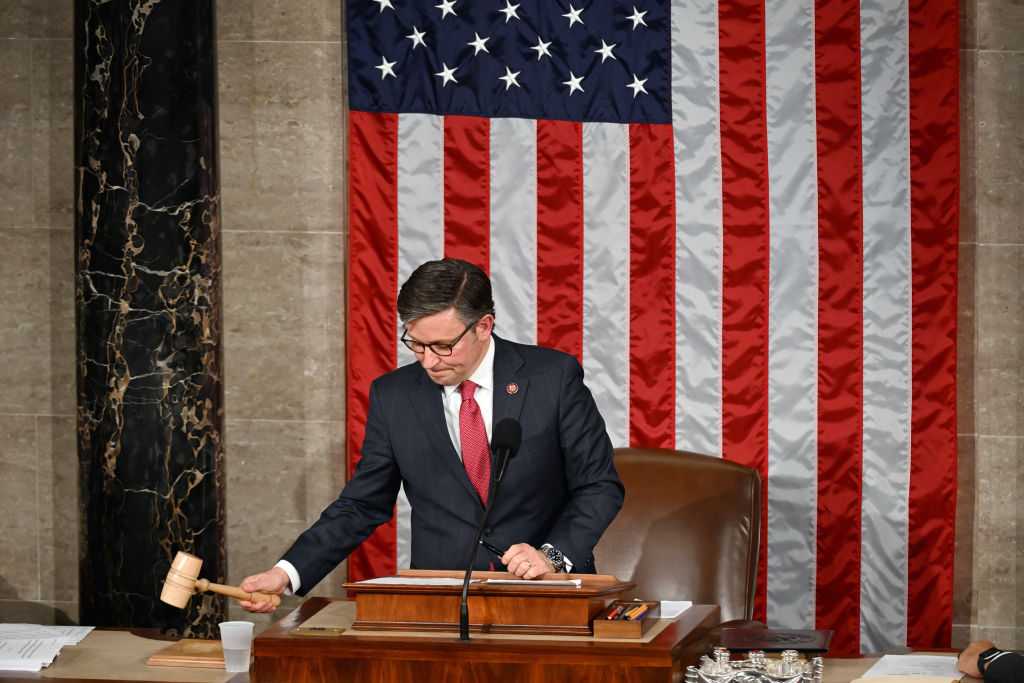As the new Congress convenes, House Speaker Mike Johnson faces a pivotal vote that will determine not only his political future but also the direction of the Republican Party. With a slim GOP majority and internal divisions, every vote counts in this crucial battle for leadership.
Mike Johnson faces a critical vote to retain his House speaker role

Key Takeaways:
- House Speaker Mike Johnson confronts a critical vote to retain his position as the new Congress convenes.
- The Republican Party’s narrow 220-215 majority necessitates nearly unanimous support within the party.
- President-elect Donald Trump’s endorsement may influence the outcome but is not a guaranteed safeguard.
- Far-right Republicans’ frustration with Johnson’s leadership poses a challenge to his reelection.
- The speaker election process requires a majority of present and voting members, making abstentions impactful.
Mike Johnson’s Battle for the Speaker’s Gavel
Mike Johnson is fighting for his political life—again. The Louisiana Republican’s hold on the House Speaker’s gavel and his position as second in line to the presidency will be tested when the new Congress convenes on Friday. With the Republican Party holding a narrow majority, Johnson will need almost every GOP vote to secure his role for another term.
A Slim Majority and Internal Divisions
The Republicans control the House with a 220-215 majority. This slim margin means that Johnson cannot afford to lose more than two Republican votes if he hopes to clinch the speakership. “It would take only two GOP lawmakers voting for other candidates to deny Johnson a majority,” highlighting the precariousness of his position.
Trump’s Endorsement: A Double-Edged Sword
Johnson has a singular asset in his favor: President-elect Donald Trump endorsed him for Speaker in a social media post at the start of the week. While Trump’s backing may sway some lawmakers, it’s uncertain whether his blessing will be enough to persuade far-right Republicans. These members have grown frustrated with Johnson’s leadership and are known to demand concessions when their votes become essential.
Challenges from Within
Johnson, 52, ascended to the speakership in October 2023 almost by accident after Republicans struggled to replace Kevin McCarthy following the unprecedented removal of the California Republican from the job. Though well-liked across the conference initially, Johnson’s handling of major funding fights—including passage of aid to Ukraine last spring and, more recently, a short-term spending bill—has turned some allies into detractors.
The Speaker Election Process Explained
Electing a Speaker is the first order of business for the House after a new session of Congress begins at noon. The House cannot organize until it has a Speaker because that person serves as the presiding officer and administrative head. Members call out the name of their choice in a time-consuming roll call that heightens the drama on the floor.
To become Speaker, a candidate needs a majority of the votes from House members who are present and voting. Historically, the magic number has been 218 out of the 435 members. However, members voting “present” instead of naming a candidate can lower the overall tally needed to reach a majority.
Historical Precedents and Potential Outcomes
The speakership has been vacant only 13 times in U.S. history, according to the nonpartisan Congressional Research Service. No Speaker had ever been removed until eight Republicans joined with Democrats to oust McCarthy. In January 2023, McCarthy endured a grueling 15 ballots over four days before he gained enough support to become the 55th Speaker.
If Johnson fails to secure a majority on the first ballot, the clerk is likely to initiate another roll call vote. The process can become protracted and messy, mirroring the challenges faced by his predecessor.
The Road Ahead
The upcoming vote is more than a personal test for Johnson; it is a barometer for unity within the Republican Party. The outcome will signal whether the GOP can coalesce around its leadership or if internal divisions will continue to hamper its legislative agenda. As Johnson stands at the crossroads of his political career, the nation watches to see if he will retain the Speaker’s gavel or if the House will once again plunge into a leadership crisis.











